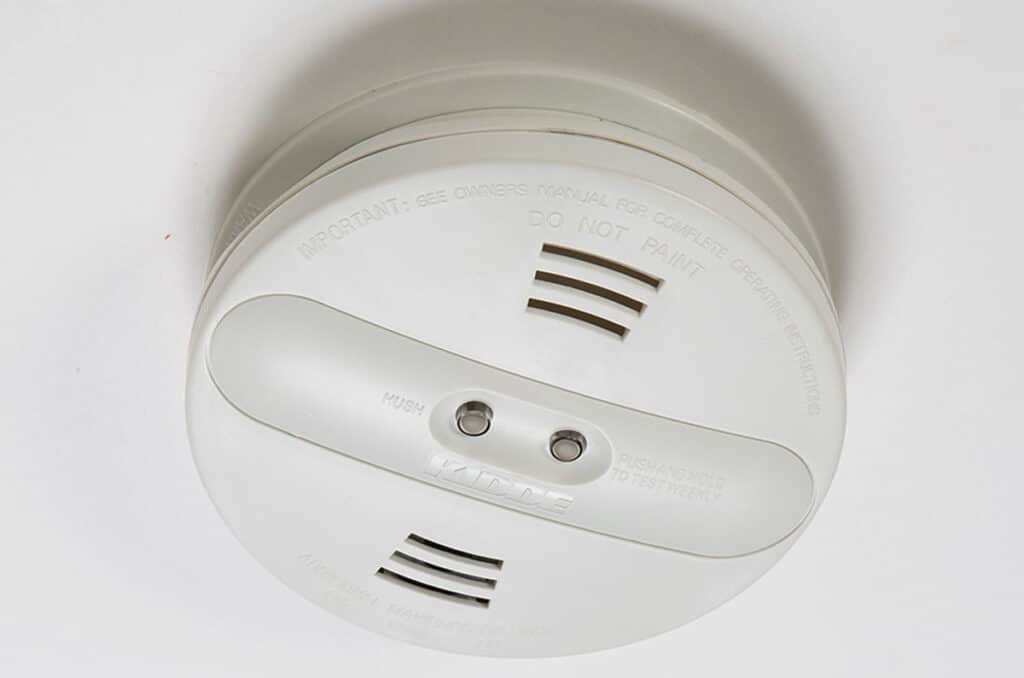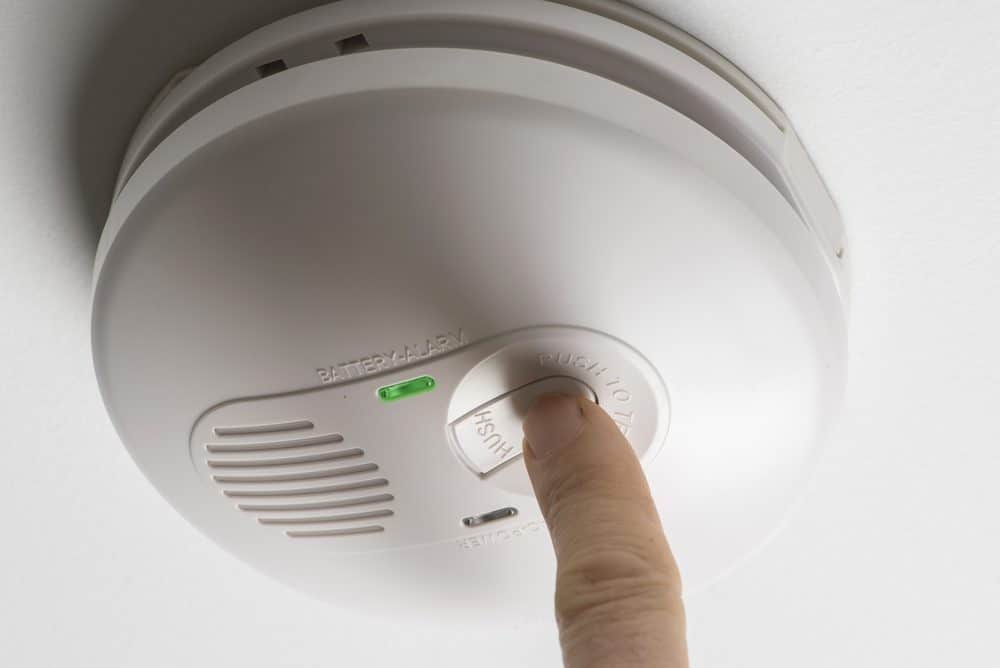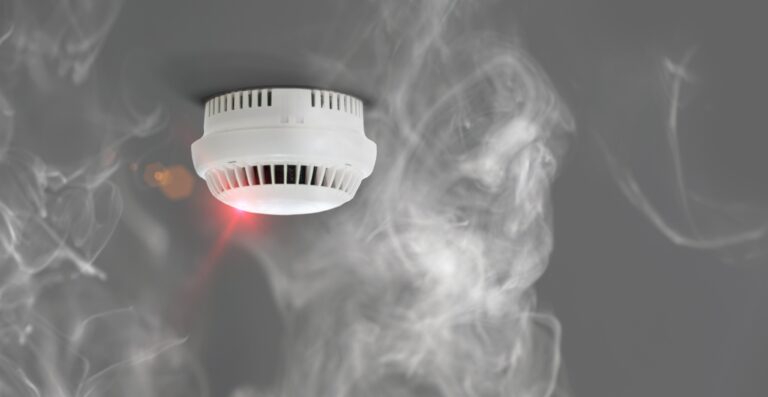Introduction
How Long Are Smoke Detectors Good For: Smoke detectors are an essential safety feature in every home, providing early warning of potential fires and saving countless lives each year. Many homeowners don’t know how long their smoke detectors will work or when to replace them. In this article, we will explore the lifespan of smoke detectors and provide guidance on when to replace them.
Smoke detectors detect airborne smoke and sound a loud alarm to warn others of a fire. Usually powered by batteries or the home’s electrical system. Smoke detectors can lose reliability over time for many reasons.
The lifespan of a smoke detector depends on several factors, including the type of detector, the quality of its components, and how well it is maintained. Generally, most smoke detectors have a lifespan of 8-10 years. However, it is important to note that this is an average estimate, and individual detectors may vary. It is crucial to regularly test your smoke detectors to ensure they are functioning correctly. Pressing the detector’s test button should sound the alert. Smoke detector batteries should be replaced annually or when the low battery indication chirps.

How do I know if my smoke detector is expired?
Smoke detectors are an essential safety feature in any home or building. They are designed to detect smoke and alert occupants to the presence of a fire, giving them valuable time to evacuate and call for help. However, like any other device, smoke detectors have a limited lifespan and can expire over time.
Check your smoke detector’s manufacture date first. Devices usually publish this information on the back or inside. If your smoke detector is older than 8-10 years, it’s probably dead. Check the gadget for an expiration date, as some manufacturers include one.
Check for smoke detector wear and damage to determine expiration. Dust and filth can cause smoke detectors to malfunction. Replace discolored, broken, or damaged smoke detectors.
To maintain good operation, inspect your smoke detector regularly. Most smoke detectors contain a test button to hear the warning. It may be time to replace the detector if the alarm is weak or silent.
Smoke detectors should be replaced every 8–10 years, even if working. They should be visually and functionally checked.Over time, smoke alarm sensors may become less sensitive, making them less able to find smoke. By keeping your smoke alarm up to date, you can make sure it always works right and keeps your home safe.
Do wired smoke detectors expire?
Yes, wired smoke detectors do expire. While they may not have an expiration date printed on them like some other household items, it is important to understand that these devices have a limited lifespan.
One of the main reasons why wired smoke detectors expire is due to the degradation of their sensors. These sensors are responsible for detecting smoke particles in the air and triggering the alarm. However, over time, the sensors can become less sensitive or even fail completely. This can result in the smoke detector not detecting smoke or taking longer to do so, which can be extremely dangerous in the event of a fire.
Besides sensor degradation, dust accumulation, electrical difficulties, and physical damage can affect a wired smoke detector’s operation. Dust can build up inside the smoke detector and interfere with its sensors, while electrical issues or physical damage can cause the device to malfunction or stop working altogether.
The brand, type, quality, and installation and maintenance conditions of a wired smoke detector can affect its lifespan. On average, wired smoke detectors should be replaced every 10 years to ensure dependability and effectiveness.
Regular maintenance and testing of wired smoke detectors are also crucial to ensure their proper functioning. This includes cleaning the device regularly to remove dust and debris, testing the alarm system monthly, and replacing the batteries (if applicable) as needed. By following these guidelines and being aware of the expiration of wired smoke detectors, you can help ensure the safety of your home and family.
How long will a smoke detector keep beeping?
Smoke detectors warn people of fires in their homes and buildings. To warn residents, smoke detectors beep loudly and high-pitched.
A battery backup device powers most smoke detectors during power outages. When a smoke detector battery is low, it beeps to signal replacement. Low batteries usually cause smoke detectors to beep for 30 days.
In addition to a low battery, a smoke detector nearing its end may beep. Smoke detectors last 10 years and must be changed. As a smoke detector nears its end of life, it may occasionally beep to indicate replacement. Smoke detectors usually sound for 7 days before dying.
Poor installation or maintenance might cause a smoke detector to sound. Smoke detectors should be installed and tested per manufacturer instructions for maximum performance. An improperly installed or maintained smoke detector may sound. Issue-specific smoke detector beeps vary in length.
Do smoke detectors expire if unopened?
Smoke detectors are an essential safety device that can save lives in the event of a fire. However, like any other product, smoke detectors have a limited lifespan. Many people wonder if smoke detectors expire if they remain unopened and unused. The answer to this question is yes, smoke detectors do expire even if they are unopened.
Smoke detectors last 8–10 years. Because detector sensors and components decay over time, they become less effective at detecting smoke. Even disused smoke detectors can fail due to internal component deterioration.
The packaging of smoke detectors usually lists their expiration dates. The detector is no longer guaranteed to work beyond this date. Therefore, check the expiration date before buying a smoke detector and replace it when it expires.
Regardless of opening, smoke detectors should be tested routinely. Press the detector’s test button to verify its operation. Testing the detector periodically can reveal problems before they become safety hazards.
Can you use a smoke detector that is older than 10 years?
When it comes to the safety of our homes, smoke detectors play a crucial role in alerting us to potential fires. However, like any other electronic device, smoke detectors have a limited lifespan.
Short answer: no. Smoke detectors alert residents of fires by detecting airborne smoke particles. Smoke detector sensors can degrade with time, diminishing their accuracy. This can delay or prevent fire detection, endangering lives and property.
Remember that the 10-year guideline is not arbitrary. The National Fire Protection Association (NFPA) recommends updating smoke detectors every 10 years because research shows that their sensors grow less efficient over time. More advanced smoke detection sensors and functionalities are available than in prior models.
Laws may also apply to smoke detectors older than 10 years. Many state and municipal building codes require residences to have working smoke detectors. A fire that revealed an old smoke detector could result in legal action.
Using an older smoke detector might sometimes create a false sense of security. Even if the gadget works properly, it may not detect a fire quickly. Replacement of an aging smoke detector with a new one that meets current safety standards is always advised.
Smoke detectors typically last 10 years. This varies by smoke detector type and model. Not all smoke detectors survive 15 years; some last 5 to 7 years. To calculate your smoke detector’s lifespan, consult its manufacturer’s instructions.
Smoke detectors constantly screen the air for smoke particles. Smoke detector sensors can fail or grow less sensitive over time, lowering their usefulness. Thus, smoke detectors must be changed before their lifespan expires to ensure optimal performance and dependable detection.
Replace smoke detectors how often?
Smoke detectors should be replaced every 10 years, according to the National Fire Protection Association (NFPA). This is because the sensors and components inside the smoke detector can degrade over time, reducing their effectiveness in detecting smoke and fire. It is important to replace smoke detectors regularly to ensure they are functioning properly and providing the necessary protection for your home and family.
Smoke detector batteries should be replaced annually or when the low battery indicator chirps. This will keep the smoke detector powered and ready to detect fires. Regularly testing the smoke detector by pressing the test button is also important to ensure it is functioning correctly.
What signs suggest a smoke detector requires replacing?
Yes, there are several signs that indicate a smoke detector needs to be replaced. One of the most obvious signs is when the smoke detector starts beeping or chirping consistently, even after replacing the batteries. This could indicate a malfunctioning sensor or a problem with the internal circuitry. Another sign is when the smoke detector fails to respond during a test. If the test button does not produce a loud, audible sound, it may be time to replace the smoke detector.
Even if the smoke detector works, replace it if it’s over 10 years old. Smoke detector sensors can lose sensitivity with time, making them less effective. Damaged or overheated smoke detector should be replaced to ensure proper operation.
Can smoke detectors become less effective over time?
Yes, smoke detectors can become less effective over time. Although meant to last for years, their sensitivity to smoke particles can deteriorate owing to several circumstances. One of the main reasons for this is the accumulation of dust and dirt on the sensors. Over time, these particles can build up and interfere with the detector’s ability to detect smoke. Additionally, the batteries in smoke detector can weaken over time, which can also affect their effectiveness.
It is important to regularly clean and maintain smoke detector to ensure their optimal performance. This includes regularly dusting the detectors and testing them to make sure they are functioning properly. Replace smoke detector batteries annually or when the low battery warning sound is heard. By taking these maintenance tasks seriously, you can help extend the lifespan of your smoke detector and ensure that they are able to effectively detect smoke and provide early warning in the event of a fire.
Are there any maintenance tasks that can extend the lifespan of a smoke detector?
Yes, there are several maintenance tasks that can help extend the lifespan of a smoke detector. One important task is to regularly test the smoke detector to ensure it is functioning properly. Press the detector’s test button and listen for the alarm. Monthly smoke detector testing is advised.
Another maintenance task is to clean the smoke detector regularly. Dust and debris can accumulate on the detector’s sensors, which can affect its performance. To clean the detector, gently vacuum the exterior and use a soft brush to remove any dust from the sensors. It is important to follow the manufacturer’s instructions for cleaning to avoid damaging the detector.
In addition to testing and cleaning, it is also important to replace the batteries in the smoke detector regularly. Most smoke detectors utilize 9-volt batteries, which should be replaced annually. Some newer models have 10-year lithium batteries. Check and replace batteries as needed to keep the smoke detector powered, regardless of type.

Conclusion
Smoke detectors are an essential safety device that every household should have. They play a crucial role in detecting and alerting occupants of a potential fire, giving them valuable time to evacuate and call for help. However, it is important to note that smoke detectors do not last forever and have a limited lifespan.
The lifespan of a smoke alarm detector depends on various factors, including the type of detector and its power source. Generally, most smoke detectors have a lifespan of 8-10 years. After this period, their sensors may become less sensitive, reducing their effectiveness in detecting smoke. Therefore, it is recommended to replace smoke detectors every 8-10 years to ensure optimal performance and safety.
Additionally, regular maintenance and testing are crucial to ensure the proper functioning of smoke detectors. It is recommended to test smoke detectors at least once a month by pressing the test button and checking if the alarm sounds. Regularly cleaning the detectors from dust and debris is also important to prevent false alarms and maintain their sensitivity.
Lastly, it is worth mentioning that advancements in technology have led to the development of more advanced smoke detectors. Some newer models come with features like interconnected alarms, which means that if one alarm detects smoke, all alarms in the house will sound, providing enhanced protection. These interlinked alarms can warn emergency responders via a home security system. To take benefit of these safety features, consider upgrading to newer models.

